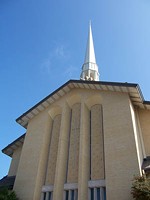Naked City
Council Watch: Seasons Change
By Emily Pyle, Fri., Feb. 9, 2001
The intricacies of city ordinances made the Four Seasons Residences the first residential property to get charged the parkland dedication fee, which requires developers to set aside space for parkland or fork over an equivalent amount of cash. Over protest from Council Member Beverly Griffith, the city asked the developers of the high-end ($300,000 to $3 million) condo project to cough up just $187,192 in fees -- a 93% reduction from the $2.6 million the property was originally slated to be charged.
The council debate centered on the importance of enforcing the parkland fee versus the social and environmental benefits of promoting residential space downtown. A 5-2 vote in favor of reducing the fee put encouraging downtown residences first. (Mayor Pro Tem Goodman sided with Griffith, who wanted the developer to pay the entire $2.6 million, in voting against the motion; Goodman's earlier substitute motion, voted down in another 5-2 split, would have required the developer to pay the cost of refurbishing the now-empty Palm Park pool, located a few blocks from the residence.)
"This is the first time that [we've] ever had to implement the parkland dedication ordinance in the downtown district," Parks Director Jesus Olivares told the council Thursday. "With the spirit that council has had in the previous years to attract development into the downtown area, staff felt that the amount was excessive in view of encouraging development downtown. We spoke to the developer and we came up with a recommendation." Olivares noted, though, that this was "not a recommendation that the developer agrees to."
The developers don't want to be charged anything at all, of course, claiming the fee ordinance is being arbitrarily applied to the Four Seasons development. "The current parkland dedication fee process is haphazard and is set up to catch only some, but not all residential development," said developer Art Carpenter. "This places a heavy burden on some and provides others with a free ride. A new system should be put in place that evenly and fairly places this responsibility on the shoulders of all residential developments."
After all, the parkland dedication fee never would have been charged if the property hadn't had to go through the subdivision process which triggers the fee. And the site never would have had to go through the subdivision process -- an unusual measure for a small downtown lot -- if the site's original plat hadn't restricted further development on the site to the office tower planned in 1983, precluding the residential tower that developers now want to build.
Though the council admitted that it's a Byzantine set of circumstances that led them to charge the fee, they were disinclined to let the developers wriggle free, noting that downtown parks could use the money.
Downtown "is a very urban setting, and we are trying to make it even more intensely urban," Goodman said. "What we're trying to do is incorporate greenery and pedestrian-friendly trails or corridors everywhere, so I cannot say waive the fee, even though I understand that Mr. Carpenter is probably the only person who ever has and who ever will be caught by this ordinance."
Road Work Ahead
Two other items passed on Thursday will address transportation issues in a world without light rail. The council voted on consent to commit matching dollars to local projects scheduled to be considered by the Texas Transportation Commission on Feb. 22. Though the amount of money the city can offer in matching dollars is likely a drop in the bucket for most any major transportation project, it may be enough to get the state to take proposed projects in Central Texas seriously. Projects that the TTC may be asked to help fund could include improvements to MoPac and Loyola Lane, though specifics were left out of the vote.
Money for the matching funds, some $6.1 million, will come from proceeds from this year's $15 million increment of the transportation bonds approved in last November's election. Another item on last week's agenda, also passed on consent, directed the city manager to negotiate with Capital Metro on how the quarter-cent of sales tax set aside for light rail should be spent. Capital Metro's board voted last month to return the $33 million from the quarter-cent to the jurisdictions it came from; about 97% of that, or about $32 million, will return to the city of Austin. The returned money must be used for transportation improvements other than those that are already planned by jurisdictions (i.e., it cannot be used to replace already allocated funds.) The money returned to Austin will be used for projects "approved by the voters," said Council Member Daryl Slusher.
To Market, to Market
A briefing this week will address the possibility of electric utility deregulation, though given the current dereg crises in California, it's not likely to be a popular idea. (See "Austin Stories," p.20, for more on the city's position on deregulation.) An ordinance coming before the council this week would require that "certain conditions be met" before the city could decide to opt in to deregulation. Yet another vote, in accordance with the 76th Legislature's Senate Bill 7, would identify Austin Energy records that fall into the category of "competitive matters" for the purposes of the Texas Open Meetings Act. ("Competitive matters" being, of course, matters AE would like to keep secret when utility deregulation begins around the state.) The recommendation to keep competitive information "protected" was made by a focus group of consumer advocates, energy consultants, and citizens; the resolution met with opposition from open records advocates Paul Robbins, Tom Smith (Public Citizen), and Kathy Mitchell (ACLU), who wrote a minority opinion opposing the recommendation. SB 7 restructured the electric utility industry, but left cities like Austin with the option to opt out of deregulation.
Got something to say on the subject? Send a letter to the editor.








